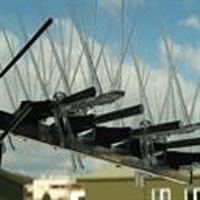
The following information is provided by
www.pigeoncontrolresourcecentre.orgLatin Name: Columba livia var (‘dove’ or ‘bird of leaden or blue-grey colour’).
Common Names: Pigeon, dove, blue rock pigeon, rock dove, wild rock pigeon, feral pigeon.
Derivation: The word ‘pigeon’ is derived from the Latin word ‘pipio’, meaning ‘young cheeping bird’. The word ‘dove’ is of Norse origin and first appeared in the 14th century as ‘dova’ or ‘douve’.
Family: Columbidae (includes 315 different species)
Subspecies: C. l. livia, C. l. atlantis, C. l. canariensis, C. l. gymnocyclus, C. l. targia, C. l. nigricans, C. l. dakhlae, C. l. schimperi, C. l. intermedia, C. l. palaestinae, C. l. gaddi, C. l. neglecta
Varieties: 350 recorded varieties.
Most Common: Feral Pigeon - 10-15 million in Europe.
Habitat: The wild pigeon is found in coastal areas and the feral pigeon is found almost exclusively in areas of human habitation.
Distribution: Worldwide except Sahara Desert, Antarctica and the high Arctic. European population estimated at between 17 and 28 million birds.
Dave B












